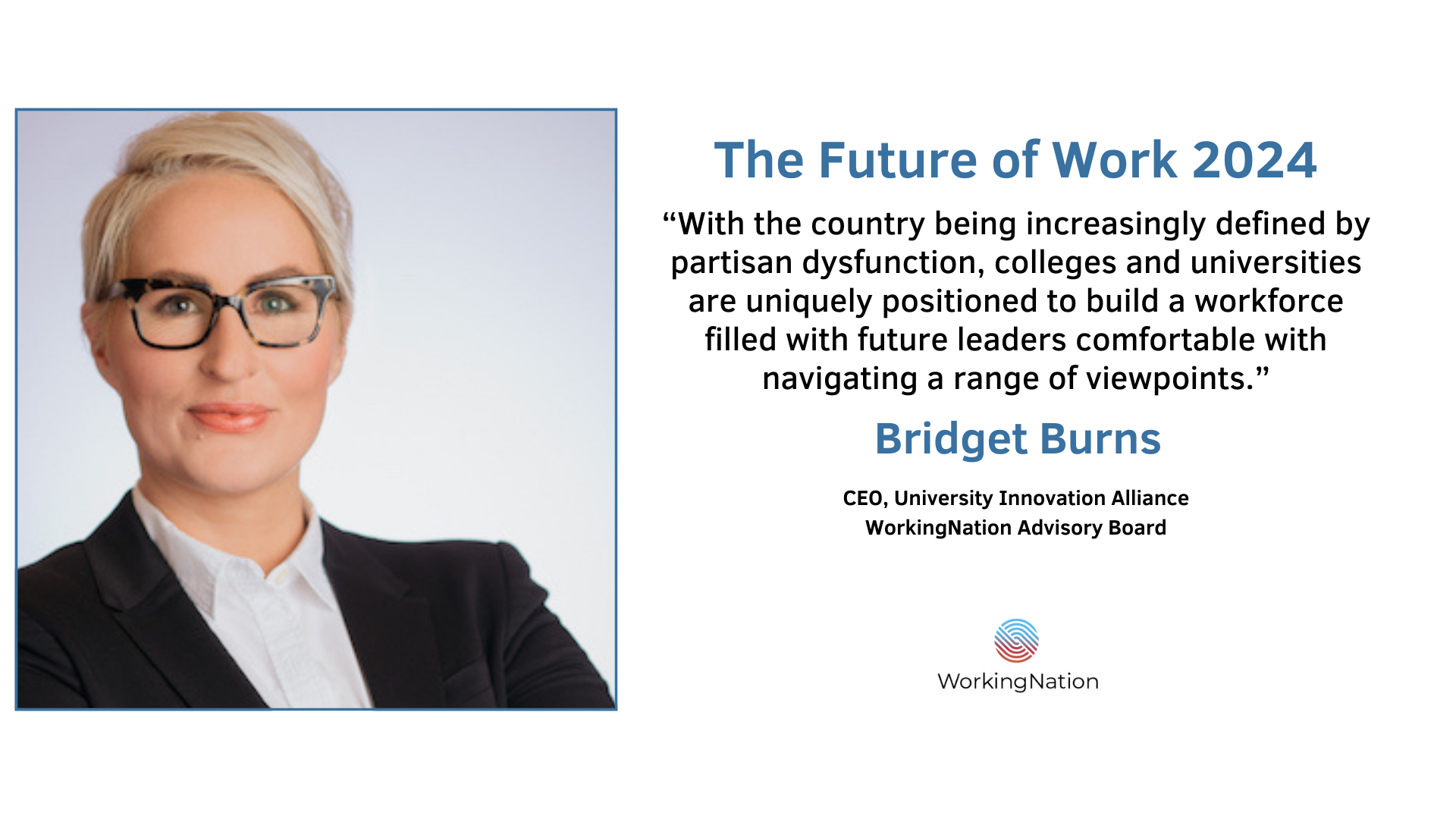Getting a foot in the door of a business as a young adult, especially for someone who doesn’t have any college experience, is hard enough. Finding a way to turn that entry-level job into a better role within the company or using it as a rung up the career ladder is even harder. Part of the problem, according to a new report, is there’s a disconnect between many employers and employees as to who should be pushing workers forward.
“Employers don’t necessarily all work under a career pathway mindset,” says Raija Vaisanen, research director for Commonwealth Corporation, a quasi-public workforce development agency that helps prepare underserved youth and other unemployed workers for in-demand jobs in Massachusetts.

The supporting evidence to her statement can be found in its newly-released report, Promoting Success, which says more than 70 percent of businesses surveyed statewide said they don’t have a formal advancement or promotion policy in place at their organization.
“When we asked employers whether they had anything formal, they sort of had the expectation that the employee was going to own their own career,” explains Naome Jeanty, co-author of the report. “There was no organized structure around having someone move up from entry-level into the next phase of their career, whether it was within that same organization, or maybe going to school, or maybe moving to a different company.”
Promoting Success is an outgrowth of earlier research into the reasons behind the steep decline in teen employment — more than 50 percent —that started nationwide in the 1990s. “Work experience is critically important for the long-term success of young people. From that earlier work, we learned a lot about how important soft skills were to employers,” according to Vaisanen.
Commonwealth developed a career readiness curriculum called Signal Success to help young people acquire the skills needed to enter the workforce — communication, collaboration, dependability and initiative. The logical next step, Vaisanen says, was figuring out what it takes to get those young adults moving ahead in their careers.
“Manufacturing and health care are two industries that have some pretty good pathway structures,” says Vaisanen. Other industries such as restaurant, hospitality and retail industries in which many young people find their first jobs, don’t have those formalized pathways to additional training.
“There were a few employers that said if they saw someone with talent, that they would approach that individual and see if they wanted to move up, but that wasn’t the norm,” explains Jeanty.

Employers said they wanted to encourage mentoring relationships between staff, managers and young adult workers, but said they expected workers to seek these out on their own.
For their part, most young workers said they didn’t know how to approach that conversation. Some felt that if they had a decent relationship with their manager, they could at least raise the issue of advancement with their boss.
“But there was no time set aside to have that kind of conversation,” says Jeanty. “There was no explicit avenue for them to learn about different job opportunities or different ways to move up in the industry.”
RELATED STORY: Moving on up? Study finds middle-skill jobs are not created equal
So, if they are not getting information on career advancement and training from their employers, where are they getting it? Many of them turn to Google, jobs boards and their families for information. And some get it from the career-readiness programs such as Signal Success that helped them prepare for entry-level jobs. Those programs are mentoring some of them on how they could improve their résumés and skillset so they could take the next step.
“For young workers to be successful, they need opportunities to learn that don’t require them to step outside their jobs,” explains Dr. J.D. LaRock, Commonwealth Corporation President and CEO. “They need opportunities to learn that are highly flexible. They need opportunities to learn that are competency-based and highly job-relevant. And they also need opportunities not just to learn content, but to continue to develop soft skills, and higher-level soft skills, that enable to them to proceed to further employment.”

For young workers who are not fortunate enough to be attached to a career-readiness program, or to have a mentor, getting ahead can be challenging. Commonwealth Corporation has taken the insight they garnered from talking with employers and young workers and put together advice on how businesses themselves can help good employees make the leap from an entry-level job to the next level.
- Managers must be explicit about expectations and opportunities. The report recommends that employers meet workers halfway by offering them information and guidance on steps to take, which skills to acquire and how skills are transferable in a next-level job. Let the worker know the metrics by which they are being evaluated and how their skills stack up to the requirements for promotion.
- Create time and space for conversations between managers and employees. Foster an open and welcoming culture with opportunities for employees to approach managers. Create individual development plans for each employee. Highlight real stories of veteran staff and their trajectories to provide context for younger workers on the ups and downs of a career.
- Invest in a system that provides entry-level workers with the skills needed to advance. Be clear about formal and informal training and technical requirements needed to advance in certain positions.
- Train managers to capitalize on talent. Teach managers to recognize, encourage, and capitalize on talent even if the employee has not approached them.
“In our work at Commonwealth Corporation, we really want to make sure that young people are empowered,” says Susan Lange, Vice President of the organization’s Youth Pathways division, which advance’s the state’s youth employment and career pathways programs.
“Employers have put the onus on the employee when it comes to promotability. We’re correcting for this, quite frankly, by making sure that young people are developing those skills that are going to empower them to be able to catapult into a career trajectory,” she tells me.
For youth-serving organizations like those Lange works with, these are the takeaways from the report on how they can prepare young workers for job advancement.
- Train young people to take charge of their career opportunities. Discuss how to approach managers about advancement. Encourage them to identify and capitalize on opportunities. Coach youth on how to talk to employers about barriers to success — for example, young parents many need strategies and networks to manage emergency child care needs. Guide entry-level workers in developing a network of adults, co-workers and others who can coach, mentor and support them in achieving their career and educational goals.
- Teach youth to effectively communicate transferable skills. Help youth recognize skills they have learned and make the connection between these skills and ones required for jobs they are interested in.
- Change the narrative around taking risks. Portray mistakes as opportunities for growth and help them navigate those instances with their employer.
“It is essential to help the people, businesses and partner organizations we serve to reach their full potential,” says LaRock in the introduction to Promoting Success. He tells me that the report’s findings validate the skills training programs Commonwealth Corporation promotes. But he also calls the report a clarion call for employers.
“In many ways, what we’ve seen here is the presence of apathy that you find when an employer doesn’t necessarily have the culture, or the structure, to be able to tap into a young person’s talents to enable them to be a long-term resource for the company,” LaRock says. “We believe, and think employers should believe, that when you invest in employees — when you support them and when you show interest in them — it’s not setting them up to leave you, it’s setting them up to stay.”
Join the Conversation: How should employers foster career advancement within their companies? Tell us your ideas on our Facebook page.











